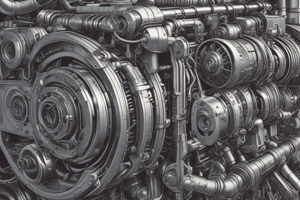Podcast
Questions and Answers
What is the main role of detergency in lubricants?
What is the main role of detergency in lubricants?
- To improve fuel efficiency.
- To increase viscosity at high temperatures.
- To prevent the accumulation of soot and deposits. (correct)
- To reduce emissions from the engine.
Which of the following factors should be considered when selecting a lubricant?
Which of the following factors should be considered when selecting a lubricant?
- Cost alone without considering performance.
- Brand reputation and marketing strategies.
- Color and scent of the lubricant.
- Engine type and environmental conditions. (correct)
What is a significant benefit of using synthetic lubricants over conventional oils?
What is a significant benefit of using synthetic lubricants over conventional oils?
- Lower cost and easier availability.
- Higher thermal stability and better viscosity characteristics. (correct)
- Less environmental impact and biodegradable.
- Longer shelf life without degradation.
What can result from neglecting proper lubrication maintenance?
What can result from neglecting proper lubrication maintenance?
What is a key feature of precision lubrication systems in modern vehicles?
What is a key feature of precision lubrication systems in modern vehicles?
What is the primary purpose of lubrication in automotive systems?
What is the primary purpose of lubrication in automotive systems?
Which characteristic is essential for engine oil to be effective?
Which characteristic is essential for engine oil to be effective?
What type of lubricant is specially designed to withstand high-stress conditions in gear-driven components?
What type of lubricant is specially designed to withstand high-stress conditions in gear-driven components?
What property of lubricants refers to their ability to form a protective film between moving parts?
What property of lubricants refers to their ability to form a protective film between moving parts?
Which lubricant is critical for efficient and safe operation of hydraulic brake systems?
Which lubricant is critical for efficient and safe operation of hydraulic brake systems?
What is a key characteristic of hydraulic fluids used in vehicles?
What is a key characteristic of hydraulic fluids used in vehicles?
Why is compatibility an important property for automotive lubricants?
Why is compatibility an important property for automotive lubricants?
What does thermal stability in lubricants refer to?
What does thermal stability in lubricants refer to?
Flashcards
Detergency
Detergency
The ability of a lubricant to prevent the build-up of soot and deposits that can harm engine performance and cause wear.
Anti-wear additives
Anti-wear additives
Additives in lubricants that help protect against wear, especially in parts like gears that experience high stress.
Lubricant selection
Lubricant selection
Choosing the right lubricant depends on factors like the engine type, how the car is driven, and the environment.
Proper lubrication levels
Proper lubrication levels
Signup and view all the flashcards
Incorrect lubricant selection
Incorrect lubricant selection
Signup and view all the flashcards
Viscosity
Viscosity
Signup and view all the flashcards
Film Strength
Film Strength
Signup and view all the flashcards
Additives
Additives
Signup and view all the flashcards
Thermal Stability
Thermal Stability
Signup and view all the flashcards
Compatibility
Compatibility
Signup and view all the flashcards
Engine Oil
Engine Oil
Signup and view all the flashcards
Gear Oil
Gear Oil
Signup and view all the flashcards
Brake Fluid
Brake Fluid
Signup and view all the flashcards
Study Notes
Introduction to Automotive Lubrication
- Lubrication is essential in vehicles to reduce friction and wear on moving parts, prolonging component life and optimizing performance.
- Different lubricants are designed for various vehicle applications, each with unique properties.
- Proper lubrication minimizes energy use and noise.
Types of Automotive Lubricants
- Engine Oil: Crucial for engine lubrication, preventing friction and wear. Formulated for specific engine types and operating conditions with specific viscosity and additives.
- Gear Oil: Used in transmissions, differentials, and gear-driven components. High viscosity and extreme-pressure additives are common for high-stress conditions.
- Hydraulic Fluid: Used in power steering and other hydraulic systems. Chemically inert and stable, designed for high-heat environments.
- Brake Fluid: Essential in hydraulic brake systems, demanding a high boiling point for safety and efficiency at extreme temperatures.
- Coolant: Prevents engine overheating, utilizing antifreeze and corrosion inhibitors to protect system components.
- Grease: Used in bearings, chassis, and components needing high load capacity and extreme-pressure lubrication, offering lubrication and a sealing effect.
Lubricant Properties
- Viscosity: A lubricant's resistance to flow, critical for performance at varying operating temperatures (cold starts, high-heat).
- Film Strength: The lubricant's ability to create a protective layer between components, reducing friction and heat generation.
- Additives: Formulations often include additives for properties like oxidation resistance, corrosion protection, and anti-wear protection.
- Compatibility: Lubricants must be compatible with vehicle components to avoid chemical reactions or degradation.
- Thermal Stability: Maintaining performance at high temperatures, crucial for engine oil and other lubricants.
- Detergency: Preventing soot and deposit buildup that degrades performance and accelerates wear.
- Anti-wear: Additives designed to prevent abrasive wear, particularly important in high-stress components like gears.
Lubricant Selection and Application
- Lubricant selection needs to consider engine type, operating conditions (e.g., driving style), and environmental factors.
- Maintaining proper lubricant levels is critical, checking levels according to vehicle specifications.
- Incorrect lubricant selection can significantly shorten component life, damage components, and reduce performance.
- Regular oil changes are necessary for optimal performance, removing contaminants and ensuring consistent protection.
Advanced Lubrication Technologies
- Synthetic lubricants generally outperform conventional oils in thermal stability and viscosity-temperature characteristics.
- Engine oil technology constantly advances with new additives and formulations for superior engine protection, performance, and longer drain intervals.
- Precision lubrication systems target specific lubrication points, optimizing control of lubricant delivery and pressure.
- Fuel economy and emissions reduction are driving research for increasingly efficient lubrication materials.
Importance of Proper Maintenance
- Neglecting lubrication can lead to significant engine damage, increased fuel consumption, and reduced component life.
- Regular maintenance schedules, including oil changes and inspections, are crucial for proper lubrication.
- Following proper procedures for oil changes and lubricant replenishment prevents potential issues and damage.
Studying That Suits You
Use AI to generate personalized quizzes and flashcards to suit your learning preferences.





